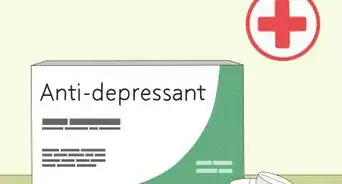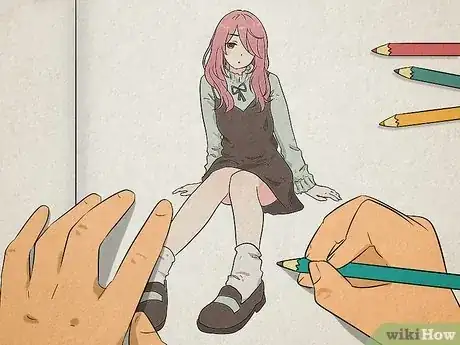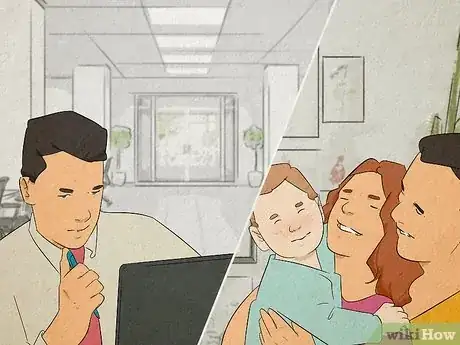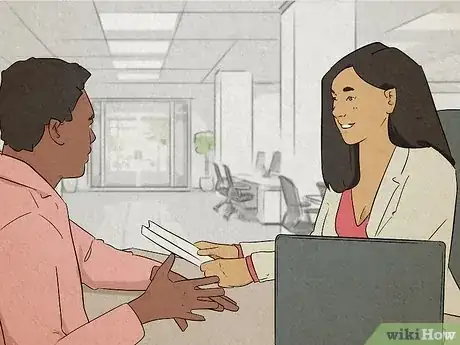This article was co-authored by Rebecca Tenzer, MAT, MA, LCSW, CCTP, CGCS, CCATP, CCFP and by wikiHow staff writer, Aly Rusciano. Rebecca Tenzer is the owner and head clinician at Astute Counseling Services, a private counseling practice in Chicago, Illinois. With over 18 years of clinical and educational experience in the field of mental health, Rebecca specializes in the treatment of depression, anxiety, panic, trauma, grief, interpersonal relationships using a combination of Cognitive Behavioral therapy, Psychodynamic therapy, and other evidence-based practices. Rebecca holds a Bachelor of Arts (BA) in Sociology and Anthropology from DePauw University, a Master in Teaching (MAT) from Dominican University, and a Master of Social Work (MSW) from the University of Chicago. Rebecca has served as a member of the AmeriCorps and is also a Professor of Psychology at the collegiate level. Rebecca is trained as a Cognitive Behavioral Therapist (CBT), a Certified Clinical Trauma Professional (CCTP), a Certified Grief Counseling Specialist (CGCS), a Clinical Anxiety Treatment Professional (CCATP), and a Certified Compassion Fatigue Professional (CCFP). Rebecca is also a member of the Cognitive Behavioral Therapy Society of America and The National Association of Social Workers.
There are 8 references cited in this article, which can be found at the bottom of the page.
This article has been viewed 5,002 times.
Life is full of decisions, but what do you do when you don’t know what choice to make? No matter what choice you’re struggling to make, take a deep breath. In this article, we’ve compiled a list of useful strategies to help you figure out your next move. Not knowing what to do may seem overwhelming, but you got this—we believe in you!
Things You Should Know
- Create a list of things you enjoy so you can prioritize activities and hobbies that help you feel good while making a decision.
- Reframe pros as goals and cons as fears to help you weigh your options more clearly.
- Know that feeling uncomfortable or overwhelmed by a decision is completely normal—it means you care deeply about the situation.
Steps
Practice gratitude.
-
Be thankful for what you have to reduce anxiety about the future. Try making a list of all the things in your life you’re grateful for. These can be big or small things, like being grateful for your family or macaroni and cheese. When you’re feeling overwhelmed, look at your list and recognize that there is so much to smile about, and one decision won’t necessarily change that.[1] X Trustworthy Source Greater Good in Action An initiative by UC Berkeley's Greater Good Science Center promoting science-based practices for a meaningful life Go to source
- Instead of focusing on what you may lose, focus on what you have.
Practice self-care.
-
Pamper yourself to shake off negativity. A little bit of self-care can go a long way, especially when it comes to self-doubt. It can be easy to feel unsure of your decisions if you constantly doubt yourself, so combat negative thinking with something positive. Do something for you—watch a favorite movie, take a long bath, or go for a peaceful walk.
- Practicing self-care doesn’t have to be elaborate or expensive. Simply do something that makes you feel good!
Do an activity that helps you feel good.
-
Give yourself a mood boost and do something you love. When life gets overwhelming, you may not think you have time to have fun or relax, but you totally do! Aim to incorporate hobbies and activities you enjoy into your everyday life. Even doing something you love for 30 minutes a day can help boost productivity and help you feel good.
- The activity doesn’t have to be big; it can be as simple as coloring, watching TV, or cooking a meal with your partner.
- Taking the time to recognize what makes you happy can help you create a plan for feeling happier moving forward, especially when it comes to making hard decisions.
Assess your fears.
-
Contemplate the pros and cons of each choice to ease fear. When tasked with a decision, it can be easy to constantly go back and forth in your head, leading to procrastination. Take some time to write out the pros and cons of each decision you could make. Then, ask yourself why you may fear one choice over the other. Do the fears or cons of one choice outweigh the pros of another?
- Think of your pros as goals and your cons as fears. Sometimes rephrasing your thoughts can help you see things more clearly.
- For instance, you may ask yourself, “Does my fear of losing quality time and money outweigh my goal of landing my dream job?”
Focus on the end goal.
-
Push worries aside, so you don’t lose sight of your goals. It can be easy to get caught up in doubts about making the wrong choice, but this mindset can make making a decision that much harder. Rather than focusing on what’s worrying you now, focus on where each choice will take you—what’s the end goal?[2] X Research source
- For example, say you’re interviewing for a new job, and your goal is to move up the corporate ladder. Try to focus less on the logistics of the job. Instead, focus on how the new role will help you get where you want to be.
Keep your values in mind.
-
Remember who you are when contemplating a decision. Each choice you make helps you grow and evolve. If you’re not sure what path to take, ask yourself, “What type of person do I want to be? What do I value in life? What interests me?” Your values shape who you are, and if a choice goes against one of your core values, it may not be the right choice for you.[3] X Research source
- For instance, say you value family, taking a job with a schedule that interferes with family time may not be ideal for you.
- Perhaps you value education, and going to a party on a school night might hinder your performance on a big test.
Ask for advice or guidance.
-
Talk about your choices to get a second opinion. Go to someone you trust (a mentor, parent, therapist, or friend) and ask them if they have time to talk. Tell them about the situation and what decision you have to make. Sometimes saying everything out loud can help you organize your thoughts and gain a new perspective. Plus, your trusted loved one may be able to give you additional insight.[4] X Trustworthy Source National Health Service (UK) Public healthcare system of the UK Go to source
Embrace discomfort.
-
Accept that feeling uncomfortable is part of the process. What you’re feeling right now is normal, and you’re not alone. It’s tough making choices, but feeling nervous, anxious, or overwhelmed means that you’re heading down the right path because you wouldn’t feel this way if it didn’t mean a lot to you. Reframe your discomfort as something you can power through rather than a sign to stop.[5] X Trustworthy Source Harvard Business Review Online and print journal covering topics related to business management practices Go to source
Stop comparing yourself to others.
-
Understand that everyone is on their own life path. Getting caught up comparing yourself to others can be easy, but know that your journey isn’t like anyone else’s. Move at your own pace and focus on what’s best for you, rather than getting distracted by others’ goals.[6] X Research source
- Remember, what makes someone else happy might not make you happy, and that’s okay!
Sleep on your decision.
-
Give yourself time to think through a decision. Who says you have to make up your mind instantly? Let yourself sleep on your choice, so you can evaluate your goals and ruminate on your decision. Taking a moment to slow down and truly think things over can stop you from making a hasty choice.[7] X Research source
- It’s perfectly okay not knowing what to do or say.
- Don’t be afraid to ask for more time to make your decision. Having a time frame for when you need to have a response can help ease anxiety.
Take a chance.
-
Try saying “yes” to more opportunities. Sometimes, there’s no clear-cut answer, and you’ve just got to go with your gut. Don’t be afraid to take a chance, try new things, and experiment! Life’s all about trial and error, so think of each decision you make as a learning experience.[8] X Research source
- For instance, if you’re unsure about what you want to major in, take classes in the fields you’re interested in and see what sticks.
Go with the flow.
-
Let the universe guide you towards a decision to ease stress. Not every decision needs to be clear-cut or drawn out. If you’ve been on the fence about a decision for a few days, consider letting someone else take the wheel. Look for signs that point to one decision or another, and stay open to all possibilities.[9] X Research source
- Going with the flow doesn’t mean letting go of all control. It simply means to observe and accept what’s happening around you.
- As Epictetus once said, “Don’t seek for everything to happen as you wish it would, but rather wish that everything happens as it actually will—then your life will flow well.”
You Might Also Like
 12 Simple Ways to Comfort a Man when He Is Stressed
12 Simple Ways to Comfort a Man when He Is Stressed













References
- ↑ https://ggia.berkeley.edu/practice/gratitude_journal
- ↑ https://www.umassd.edu/fycm/decision-making/process/
- ↑ https://opportunity.ucdavis.edu/sites/g/files/dgvnsk2741/files/inline-files/values-based-decision-making_1.pdf
- ↑ https://www.nhs.uk/mental-health/feelings-symptoms-behaviours/feelings-and-symptoms/anxiety-fear-panic/
- ↑ https://hbr.org/2021/04/6-strategies-for-leading-through-uncertainty
- ↑ https://ideas.ted.com/dear-guy-help-i-dont-know-what-i-want-to-do-with-my-life/
- ↑ https://www.weforum.org/agenda/2016/05/sleep-on-it-what-science-tells-us-about-making-decisions/
- ↑ https://ideas.ted.com/dear-guy-help-i-dont-know-what-i-want-to-do-with-my-life/
- ↑ https://www.forbes.com/sites/theyec/2020/09/22/go-with-the-flow-the-power-of-wishing-things-as-they-are/?sh=506da9465061
About This Article

























































